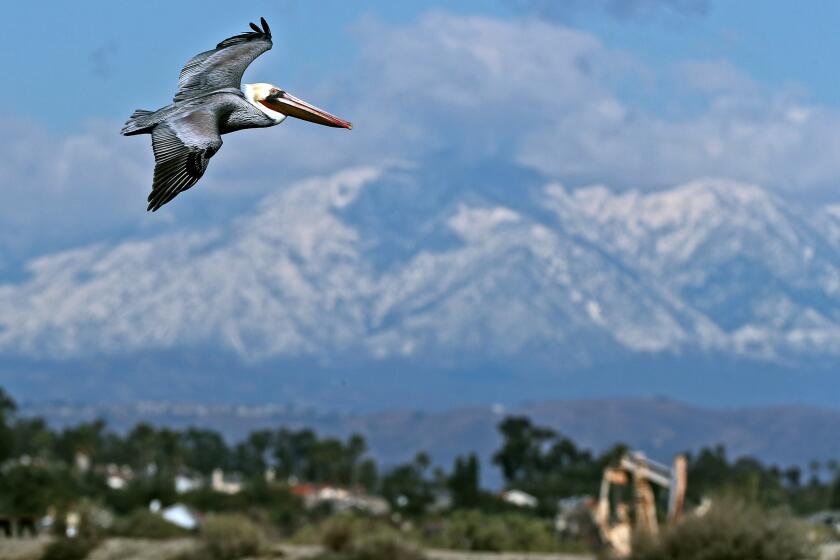D.A. to Carry Mannes Case to High Court : Legal system: Prosecutors are seeking to retry a drunken driver on murder charges. She killed three young men.
Ventura County Dist. Atty. Michael D. Bradbury announced Thursday that he will ask the U. S. Supreme Court to let his prosecutors retry Diane Mannes for murder in the drunk-driving deaths of three young men in 1989.
The decision came three days after the U. S. 9th Circuit Court of Appeal affirmed the 1991 ruling of a federal district judge, who said Mannes cannot be retried because of the Constitution’s double-jeopardy clause.
The appeal, which will be made within 90 days, promises to delay resolution of the Mannes case for months and possibly years, attorneys on both sides said.
“If the court decides to accept the case, it could be another two years, easily, before a final decision,” said Deputy Public Defender Neil B. Quinn, who successfully argued the case before the 9th Circuit.
Ronald C. Janes, who heads the major-crimes unit of the district attorney’s office, agreed that there is “no question that this is going to create additional delay in the case.”
But Janes, speaking for Bradbury, said the delay is warranted because “the double-jeopardy clause does not apply to this situation. What you have here is just a continuing misinterpretation by the federal courts of what the state court meant.”
Mannes was convicted of drunk driving and injuring two other young men in the crash, which occurred on the Ventura Freeway between Camarillo and Thousand Oaks. She has been paroled after serving about half of a four-year sentence.
But the Ventura County Superior Court jury deadlocked on whether Mannes was guilty of murder. Rather than reset the case for a new trial, as requested by prosecutors, Judge Robert J. Soares dismissed the charge.
Soares wrote that he did not believe that prosecutors had proven three key elements of second-degree murder: that Mannes acted with malice; that she knew her conduct carried a high probability of death, and that being aware of the probability of death, she consciously decided to act anyway. Soares said he believed that no 12 jurors would be able to agree on a murder verdict.
But Soares also wrote that in spite of his ruling, he believed that the prosecutors could refile the murder charges.
The federal courts have disagreed. They ruled that Soares’ finding constituted an acquittal, and that prosecutors cannot retry Mannes for murder. The federal courts left open the possibility that Mannes could be prosecuted on the lesser charge of manslaughter.
Janes noted that before the federal judges got involved, state courts on every level had upheld the prosecutors’ right to retry Mannes for murder.
“Judge Soares could not have been any clearer that we had the power to refile if we chose to do so. Every state court has agreed with us.”
Janes acknowledged two practical difficulties in continuing to appeal the case:
* The Supreme Court typically agrees to hear fewer than 1% of the cases it is asked to consider.
* Even if the high court hears the case and reverses the 9th Circuit decision, persuading another jury to convict Mannes of murder will not be easy.
“It’s not a slam-dunk,” Janes said. “On the other hand, the conduct in this case is so egregious that I think we’re mandated to go ahead.”
He noted that on the day before the fatal crash, Mannes had been arrested in the San Fernando Valley on suspicion of drunk driving. That case is still pending.
“Here we have a woman who had been arrested for DUI and goes out the next day and does the same thing,” Janes said. “This time five people are victimized. . . . We should try to prosecute to the fullest extent.”
As for whether the Supreme Court will accept the case, Janes said the conservative high court has often disagreed with the more liberal 9th Circuit.
Public Defender Kenneth I. Clayman said he hopes that the Supreme Court will let the ruling stand.
“This case has been around for a long time,” Clayman said. “The jury did not find a murder. The judge made a statement that two courts have interpreted to mean that no jury would ever convict on a murder charge. . . . The time has come to try the case on the proper charges.”
More to Read
Start your day right
Sign up for Essential California for news, features and recommendations from the L.A. Times and beyond in your inbox six days a week.
You may occasionally receive promotional content from the Los Angeles Times.






